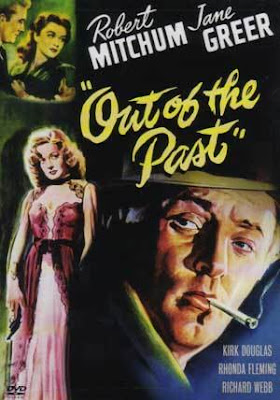
The plot runs thick in Jacques Tourneur's Out of the Past. I'm still not sure that I caught every twist and turn and every motivation, but that's only for real sticklers. The film's structure is relatively unique, in that the first third is told in flashback, while the rest occurs in the present.
Jeff Bailey is a former private detective who is now living in a small town with his lover, Ann. Bailey is deftly played by Robert Mitchum, who is, as always, full of win. As it turns out, he has a past he has kept hidden, which he is forced to reveal when it tracks him down. Here, the film goes into a lengthy flashback, in which we see that Bailey has been hired by crime lord Whit Sterling (Kirk Douglas) to track down his girl, Kathie (Jane Greer) and bring her home. In doing so, big surprise, Bailey falls for her and they go on the run. Back in the present, Sterling seeks revenge by attempting to frame Bailey for murder, and weaving a plot almost as intricate as the mis-en-scene that the narrative is all staged upon.

What is really eye-catching about this film is its look. Each frame seems to have been crafted with deliberate intricacy, as a result, I often found myself lost in the imagery, exploring the canvas. The film time is divided between natural settings and urban ones. With the mis-en-scene, Tourneur draws out a sense of ominous entrapment from both. The film opens with an almost pastoral view of Bailey and his new lover, Ann, rendezvousing by a lake. Contrasting this, the waterfront in Mexico becomes a cage with the use of the fishing net suspended behind Bailey. At the very end, the claustrophobia of the woods, as well as the skeletal shadows of the trees across his face, demonstrate a final trap from which Bailey cannot escape. I found these natural settings the most intriguing because they are relatively out of place in a noir, but with Tourneur's skill, they are no less bleak than the angular buildings and neon lights of the city. Kathie, while standing on a balcony overlooking the mountains, recalls them fondly, as a representation of freedom, but this is an ideal that does not hold up in this dark universe.

As a character, Bailey is the standard noir private eye with a personal code of honor. Despite stealing Sterling's girl and running off with her, he feels burdened by the money he owns the crime lord. For this reason, he is easily drawn in by the vengeful Sterling, all the while knowing that he might be confronting his doom. As the two men note, it is in their respective natures to follow the courses of action they are both now following, as if they cannot help it. This is also a line that Kathie repeatedly uses when she gets in trouble; she couldn't help it, her hand was forced. This is true in the sense that she can't help but do whatever she can to help herself. One gets the sense that the characters are all trapped by their natures, that every step of the narrative is predetermined, not by fate in the traditional sense, but by a fate that results from the nature of the self, an unwillingness to swerve from their motivations.
This is a great film--as entertaining as it is beautiful.

can a film that is set in the present from the past ever really take place in the present? do you think that is attainable? am i just chattering? i'm chattering
ReplyDelete